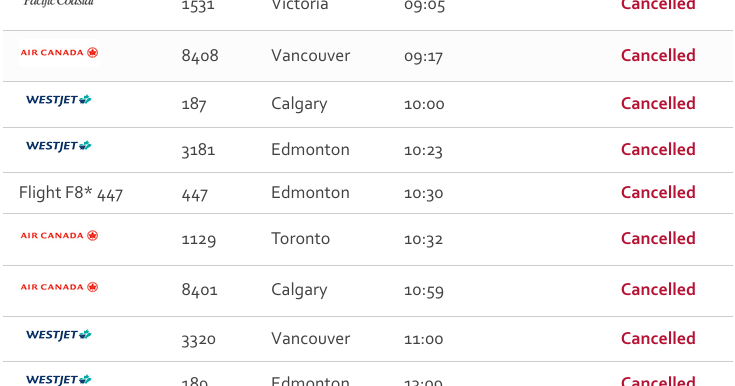Most flights in and out of Kelowna are expected to be canceled today due to a massive wildfire burning in the North Okanagan.
The BC Wildfire Service has created a no-fly zone for commercial aircraft as their crews battled the 32,000 ha. White Rock Lake fire between Vernon and Kamloops.
“The no-fly zone over the White Rock Lake fire has restricted the instrument approaches in and out of the airport which are required on low-visibility days such as today,” YLW senior operations manager Phillip Elchitz said Monday morning.
“We are working with Transport Canada, Nav Canada, and the BC Wildfire Service on an interim measure that would allow limited operations in and out of the airport. We don’t expect that interim measure to be in place today; we are hopeful of it will be in place tomorrow,” Elchitz said.
As of 9:30 am, the YLW website shows 10 arrivals and 12 departures cancelled. A few flights are shown as delayed.
Most flights shown after 2 pm are currently shown as being on time. Passengers should check their website and contact their airline.
Meanwhile, a section of Westside Road between Head of the Lake Road and Westshore Road on the northwest side of Okanagan Lake, has been closed and evacuation orders given for dozens of properties in the North Okanagan.
The order issued by the North Okanagan Regional District covers all properties south of and including Six Mile Creek Road to the boundary of the Central Okanagan Regional District. Previous evacuation orders for Bouleau Creek and Pinaus Lake remain in effect.
As well, the Okanagan Indian Band has issued an evacuation order for dozens of properties, covering an area it describes as subdivisions below the Whiteman Creek drainage, south of the Mud Hole, including Parker Cover and Whiteman subdivision. Specific addresses are listed on the OKIB website.
Very little rain fell Sunday on the part of the White Lake Rock fire that is burning most intensely, the BCWS said.
“Conditions on site continue to be extremely smoky, which is hampering the ability for aircraft to fly and is challenging suppression efforts,” the BCWS said in a Sunday update. “Crews are continuing to work toward safe, achievable operational objectives under extremely adverse conditions.”
The fire is being worked by 118 firefighters, 11 helicopters, and 42 pieces of heavy equipment. The helicopter fleet includes a Sikorsky 64 SkyCrane, which has a 2,650 gallon tank that can be filled up in less than one minute.










